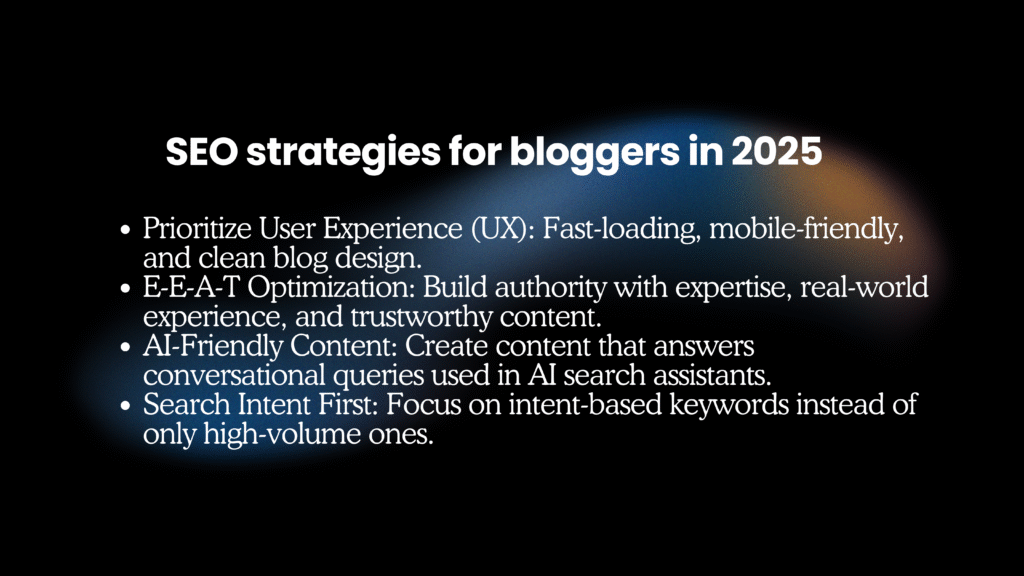Currently Empty: ₹0.00
SEO for Bloggers in 2025 – Last Strategy to Rank on Google
Introduction
Blogging has never been more competitive than today. Every other, thousands of blog posts are published, and only a fraction reach the top of Google’s search results. Lately, you can fill some keywords in 500-word articles and ranking. But in 2025, SEO is smarter, hard and more user -centric.
So, how can you ensure that your blog not only survives, but also grows? The answer lies in using modern SEO strategies that match Google’s AI-powered algorithms, the user’s intentions and search journey. Last Strategy to Rank on Google . SEO for Bloggers in 2025 – Last Strategy to Rank on Google .
In this guide, we will cover the latest SEO strategies for bloggers in 2025, helping you rank higher rank, attract loyal readers and increase blog revenue.
Problem: Why Traditional SEO fails in 2025
Many bloggers still depend on chronic techniques: keywords, spammy feedback or card publishing, generic posts. They no longer work.
- AI Operated Search: Google’s Discovery Generative Experience (SGE) provides immediate AI summaries, reducing thin material traffic.
- Material Overload: Millions of new blogs appear each month, making visibility difficult.
- User-first rank: Google prioritizes value, speed and reliability, not hack.
Example:
If you publish a 700 -word “SEO tips” posts without original insight, it will be buried under participants that provide long, structured and reliable materials.
Movement: Risk of ignoring modern SEO
If you ignore the modern SEO, take the risk:
- Traffic drop – your blog never appears on the first page.
- Low authority – search engine and readers do not trust your site.
- Lost income – no rank = no click = no revenue.
- Irelevance-AI-operated platforms will replace you.
Imagine spending six months writing 50+ articles, but getting less than 100 monthly visitors. It is the fate of bloggers who do not develop SEO for Bloggers in 2025.
Solution: SEO strategies for bloggers in 2025

Here are the best strategies you need to implement to rank on Google this year.
1. Focus on search intention, not keywords
Instead of writing just for “keywords”, write for what users really want.
Examples: “Best Blog Tools” Find user wants to compare, review and prices, not just a list.
Use tools such as Ahrefs, Semrush or Google People, also ask to highlight the intention of the real user.
2. Customize to Google’s search generative experience (SGE)
The AI summary of Google draws materials from reliable sources. To appear there:
- Write direct, structured answers.
- Use bullet points, sub -headings and FAQ skiing.
- Add cover deep so that your content is out as official.
3. Strengthen e-a-a-t (experience, competence, authority, reliability)
- Specialize the authors add to BIOS.
- Use reliable sources and link to research data.
- Share personal experience, example and case study.
Google trusted real bloggers with real rights on faceless AI material.
4. Balance AI + Human Writing
AI tools can help you with brainstorm, research and draft, but Google prefers human originality.
Add unique insight, history and personal experience to make your content unattainable.
Examples: Instead of AI-written generic “SEO tips”, you can share your experience by ranking a blog with SEO in 2024-25.
5. Prefering user experience (UX) and core web vital
Google ranks websites that are sharp, mobile -friendly and attractive.
- The blog loading time should be less than 2.5 seconds.
- Use clean setup, easy navigation and responsible design.
- Contact PageSpid Insights and Gtmetrix.

6. For a long time the depth still wins
Blogs with 2000 words perform better in 2025.
- Use scannable formatting: H2/H3 Sub -header, moldings, images.
- Add videos, charts and infographic to more engagement.
Data: A backlinko study found that longer posts get 77% more feedback.
7. Customize voice searches and interactive questions
More users are searching through smart assistants.
The target meetings on the long-neck keywords:
- “What are the best SEO tips for bloggers in 2025?”
- “How do I rank my blog quickly to Google?”
Use the convergent writing style to catch speech searches.
8. Build smart feedback (quality> volume)
Backlink still means something – but only when they are relevant and official.
Strategies:
- Guest lookup on the industry blog.
- Digital PR campaign.
- Haro (help a reporter).
A feedback from Forbes or HubSpot is priced to more than 100 random directors.
9. Establishment of Opeyan Authority and Material Group
Google rewards blogs that elaborate on a topic.
Instead of scattered posts, build material groups.
Examples for a blog blog:
- Main Piles: “How to start a blog in 2025”
- Cluster: SEO for bloggers, blogging equipment, mudification, case study.
This indicates Google that you are an authority in your niche.
10. Promote commitment and social signals
Google measures how users interact with your site:
- Time spent on page
- Information
- Stock
Encourage discussions, choices and societal newspapers.
A blog with an active society ranks more than one with passive traffic.

Prove your SEO for future future
- Update old posts regularly to keep them healthy.
- Diversity in traffic sources: Social media, newspaper, YouTube.
- Continue learning- Google updates the algorithm thousands of times a year.
Common questions – SEO for bloggers in 2025
Q1. Is SEO still important for bloggers in 2025?
Yes. The SEO blog is still the backbone of traffic. But strategies must be compatible with AI, voting and user intentions.
Q2. How long will a blog post be kept in 2025?
At least 1,800-2 500 words, but more than counting more than quality and depth.
Q3. Can AI-made content rank on Google?
Yes, but only if it is edited, fact -oriented and expanded with human insight. Clean AI material is risky.
Q4. How do I rank quickly as a new blogger?
Targeted the keywords with long tail, publish in -depth guides and produce some high -quality feedback.
Q5. What is the most important SEO factor in 2025?
User intention and material value. If your blog solves better problems than participants, you will rank.
Conclusion
In 2025, SEO for bloggers is no longer about tricks – it’s about faith, depth and adaptability.
To rank on Google this year, you need:
- Write for the user’s intention, not just keywords.
- Balance AI efficiency with human originality.
- Be aware of e-e-a-t, ux and current authority.
- Make community engagement around your content.
If you are constantly using these strategies, your blog does not just attract clicks – it will be a reliable brand and source of income in the digital world.
https://jioskill.com/web3-explained-the-future-of-the-internet/
https://codexon.in/top-10-cryptocurrencies-to-see-this-year/







